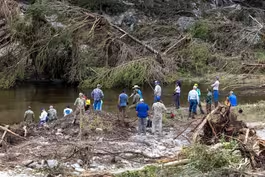
What to know about mental health misinformation online
Clip: 7/20/2025 | 4m 51sVideo has Closed Captions
What to know about the rise of mental health misinformation on social media
In recent years, people have become more comfortable sharing their personal experiences about mental health, a sign that stigma around it is diminishing. On Instagram and TikTok combined, there are nearly 90 million posts with the hashtag “mental health.” But not all the information online is accurate. Stephanie Sy speaks with licensed psychologist Taisha Caldwell-Harvey to learn more.
Problems playing video? | Closed Captioning Feedback
Problems playing video? | Closed Captioning Feedback
Major corporate funding for the PBS News Hour is provided by BDO, BNSF, Consumer Cellular, American Cruise Lines, and Raymond James. Funding for the PBS NewsHour Weekend is provided by...

What to know about mental health misinformation online
Clip: 7/20/2025 | 4m 51sVideo has Closed Captions
In recent years, people have become more comfortable sharing their personal experiences about mental health, a sign that stigma around it is diminishing. On Instagram and TikTok combined, there are nearly 90 million posts with the hashtag “mental health.” But not all the information online is accurate. Stephanie Sy speaks with licensed psychologist Taisha Caldwell-Harvey to learn more.
Problems playing video? | Closed Captioning Feedback
How to Watch PBS News Hour
PBS News Hour is available to stream on pbs.org and the free PBS App, available on iPhone, Apple TV, Android TV, Android smartphones, Amazon Fire TV, Amazon Fire Tablet, Roku, Samsung Smart TV, and Vizio.
Providing Support for PBS.org
Learn Moreabout PBS online sponsorshipJOHN YANG: In recent years, people have become more comfortable sharing their personal experiences with mental health, a sign that the stigma surrounding it is diminishing.
On Instagram and TikTok combined, there are nearly 90 million posts with the hashtag mental health.
And terms like gaslighting, trauma and toxic relationships are now part of everyday conversation.
But not all the information online is accurate.
Stephanie Sy spoke with Taisha Caldwell-Harvey, a psychologist and founder of the private practice the black girl.
STEPHANIE SY: Dr. Taisha, how do you see social media contributing to misinformation about mental health?
TAISHA CALDWELL-HARVEY, Founder and CEO, The Black Girl Doctor: Yes, there's so much we're seeing, really anybody right now can say anything that they want to on the internet and about any topic.
And while in a way that can be really good, it also means that, you know, the rate at which something spreads like wildfire has nothing to do with how accurate the information is.
And right now we're seeing so many creators and people just sharing their experiences online, but equating their experience to a reality for others and to fact and it's just not really, it's not really true.
STEPHANIE SY: To what extent do you think social media, the misinformation, the self-diagnoses, leads to people sort of pathologizing what might be considered of more normal emotions and stress responses that we all have and what are the potential risks of doing that?
TAISHA CALDWELL-HARVEY: Yeah, I think one of the huge dangers really is invalidating or downplaying mental illness by equating it to symptoms of a diagnosis.
And so we can all experience anxiety, we can all experience sadness, periods of high distractibility, but that doesn't mean that we have, you have anxiety disorder, it doesn't mean that you have depression, it doesn't mean that you're neurodivergent and it doesn't mean that you have PTSD.
And using language in that way can be extremely harmful.
To someone who has these diagnoses because it can make them question themselves and it also can make society more critical and less supportive.
STEPHANIE SY: What do you think is driving this?
And in some ways is having an ADHD or an autism self-diagnosis becoming sort of a form of identity?
TAISHA CALDWELL-HARVEY: I think people look for community, right.
When you're experiencing something and you want to give it language, social media can be a great place to search that term or to search and experience and just start finding other people and you know that you're not alone, which is really powerful and oftentimes can be the first step that people take before they get help.
And that's one of the reasons why I love that more people are talking about this.
Psychologists for years have been trying to get people to get help instead of sit in suffering.
And so now there's this cultural shift with younger millennials.
Gen Z, I feel like is leading the charge and people are hungry for language to express themselves.
They want to talk about how they're feeling and they want to rid themselves of the shame and stigma and want to just live out loud and be like I can have a full human experience.
And I think that part is extremely beautiful.
STEPHANIE SY: And yet it seems maybe to be an overcorrection is what you're saying.
So what would you say, what advice would you give to sort of rein this back into a place where one can identify when they need to see a real therapist?
TAISHA CALDWELL-HARVEY: Yeah, yeah.
Well, one never self-diagnose on TikTok.
And I think definitely when you have a cultural shift, you often get this pendulum swing.
Right.
And I think we have kind of swung really far one direction and I'm hoping we will settle back out somewhere in the middle.
We know from research that 50 percent of all adults will experience a mental illness in their lifetime.
And so if you're going to have people online talking about their whole life bold and loud, they then we're going to have content around how we navigate and navigate our mental health and how we deal with mental illness.
And so I don't think it's wrong, but I think we really need to separate what is.
I'm sharing my experience and somebody receiving it that way versus your experience as an individual person is so important that it deserves to be the center point of what this symptom is, right?
And I think for people really needing to be careful of what you absorb and in terms of who you take advice from, think about it like you would your physical health.
Would you take advice and start taking medication from somebody on TikTok that had no qualifications to prescribe medication?
You really need to think about your mental health the same way.
It's okay to listen to people's experiences, but it really need to stop when it comes to now I'm going to do what they did.
STEPHANIE SY: That is Taisha Caldwell-Harvey, founder and CEO of the Black Girl.
Doctor, thank you so much for joining us.
TAISHA CALDWELL-HARVEY: Thank you so much for having me.
Flint removes thousands of lead pipes, but problems remain
Video has Closed Captions
Clip: 7/20/2025 | 5m 21s | Flint removes thousands of lead pipes in major milestone, but these problems remain (5m 21s)
Malaysia stops accepting plastic waste from rich nations
Video has Closed Captions
Clip: 7/20/2025 | 4m 27s | Malaysia stops accepting plastic waste from the U.S. and other rich nations (4m 27s)
News Wrap: Number of missing from Texas floods drops to 3
Video has Closed Captions
Clip: 7/20/2025 | 2m 26s | News Wrap: Number of missing from Texas floods drops to 3 people (2m 26s)
Palestinians describe risking death to get food aid in Gaza
Video has Closed Captions
Clip: 7/20/2025 | 6m 23s | Palestinians describe choice between starvation and risking death to get food aid in Gaza (6m 23s)
Providing Support for PBS.org
Learn Moreabout PBS online sponsorshipSupport for PBS provided by:
Major corporate funding for the PBS News Hour is provided by BDO, BNSF, Consumer Cellular, American Cruise Lines, and Raymond James. Funding for the PBS NewsHour Weekend is provided by...















